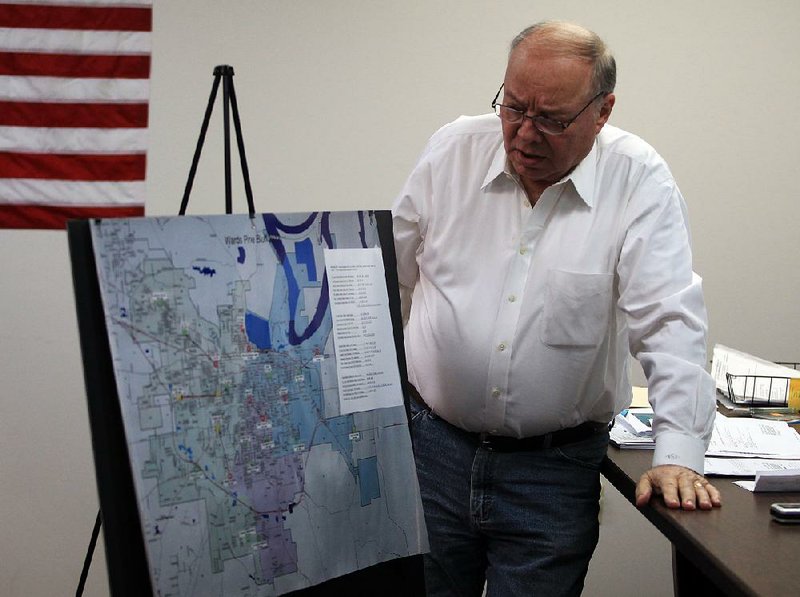PINE BLUFF -- Election commissioners in Jefferson County are at an impasse over the need to replace the county's antiquated voting machines and the cost to replace them.
The county currently uses iVotronics voting machines and software supplied by Election Systems & Software in its 39 polling sites. It owns about 150 machines that are kept in the Election Commission office in Pine Bluff.
Commissioner Stu Soffer recently presented a proposal from Election Systems & Software for the purchase of 140 ExpressVote voting machines, the latest model of electronic voting machines available from the company. Included in the proposal were 140 ExpressVote kiosks, 43 model DS200 vote tabulators, 74 printers and 74 tablet computers, as well as all related software and training.
The total cost for the hardware, software and support services included in the proposal was $882,361,52. Post-warranty license, maintenance and support fees would add an additional $42,201 annually.
Soffer said the county purchased 175 iVotronic voting machines in 2005. Over time many of those machines have needed replacement for various reasons, including two incidents that involved water damage. The latest water incident occurred when the Election Commission building flooded in April, ruining all of the machines in storage.
Soffer said the commission replaced those machines with 150 surplus iVotronic machines that it received from Grant and Craighead counties after those counties purchased new machines.
"I've been able to pick up machines from other counties as they've replaced them," Soffer said. "But we're going through voting machines like water."
Lonoke County used iVotronics machines during the 2018 primary election, but purchased 80 ExpressVote machines for the general election. Lonoke County Election Commission Chairman Mickey "Stubby" Stumbaugh said it was "like the difference between night and day."
"The iVotronics machines were old, they hadn't been stored properly and had all kinds of problems," Stumbaugh said. "It took us until 4 o'clock the morning after the primary election to finally get all the votes counted. We had all the votes in the general election counted before 10 p.m.
"The new machines are expensive, but if you can get them, you need to get them."
Soffer also backs a plan to consolidate some county polling locations and create vote centers where any registered voter in the county can go to cast a ballot. He said the plan would reduce the number of polling sites from 39 to 29 and save $15,000 to $20,000 per election in even-numbered years.
To create vote centers while still ensuring the integrity of the vote would require the upgrade to the new voting machines, Soffer said.
No other counties in Arkansas have both designated polling sites and vote centers, according to the state board of elections office, but there is nothing that prohibits a county from doing so.
It remains to be seen how cash-strapped Jefferson County would pay for new machines if they were approved. Any purchase would have to pass two hurdles. The Election Commission would have to approve a request to the Quorum Court to make the purchase, and the Quorum Court would have to approve the purchase.
County Judge Gerald Robinson told county officials Thursday that a looming financial disaster is unavoidable unless the county makes cuts soon. He proposed that the county eliminate 10 employee positions by April 1 to save $400,000 a year.
Commissioners Michael Adams and Soffer, both Republicans, favor buying new voting machines. Commissioner Ted Davis, a Democrat, does not.
Davis said he believes the county will need to make the move to the upgraded system eventually, but with the current budget crisis and the fact that it is an off-year election-wise, now is not the best time.
There is a possibility the county would not have to shoulder the entire cost of buying new machines. The state has entered agreements with some counties to pay between 50 percent and 80 percent of the cost for the machines, and in a few cases even 100 percent of the cost.
Chris Powell, a spokesman for Secretary of State John Thurston, said Friday that the state has no such agreement in place with Jefferson County and that such agreements are done on a case-by-case basis. Not all counties receive assistance.
"That will have to be worked out when funds are available," said Powell, adding that such an agreement "depends on the circumstances and the availability of funds."
Davis said he also opposes the idea of reducing the number of polling sites. He said a reduction in the number of polling places could result in fewer people casting ballots, a concern that Soffer said is misplaced.
"We're trying to make it easier for people to vote, not harder," Soffer said. "Voting centers work just like early voting, allowing voters to cast a ballot at any vote center in the county."
Any reduction could result in voters in some parts of the county having to travel a longer distance to vote, Davis said, which could discourage voter participation. He said the Election Commission's responsibility is to ensure that as few barriers as possible exist between voters and the ability to cast their votes.
"We're all cost-conscious," Davis said. "We have to be, but at the same time we're not going to let cost affect people's ability to vote."
State Desk on 01/20/2019
